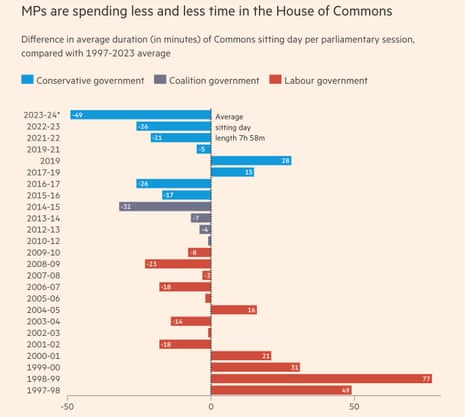Rishi Sunak rules out 2 May general election as report shows Commons working hours fallen to a 25-year low – UK politics live
Good morning. Rishi Sunak has ruled out calling a general election on 2 May. This is no great surprise to anyone working in Westminster (despite what the Labour party claims), but worth knowing anyway, particularly for journalists with holiday plans for April. Here is the clip.
'There won't be an election on that day'
— ITV News West Country (@itvwestcountry) March 14, 2024
Rishi Sunak confirms there won't be an election on 2 May pic.twitter.com/DWERCVBoO3
Sunak does not have to call an election until January next year and in normal circumstances a prime minister could defend putting off polling day on the grounds the government still has plenty of legislation to pass.
But a report by Lucy Fisher in today’s Financial Times has killed that as an excuse. Fisher says the average amount of time the Commons spends sitting every working day is now at its lowest level for a quarter of a century. She says:
The average duration of a Commons sitting day in the current parliamentary session, which began in November, has been 7 hours and 9 minutes, a record low since New Labour came to power in 1997, the FT found …
On Tuesday last week the Commons adjourned at 3.53pm, while on one Monday earlier this month almost five hours were dedicated to an unfocused “general debate on farming”, critics pointed out …
Between 1997 and 2023 the average was 7 hours and 58 minutes — or 49 minutes longer than in the current session, the analysis showed. The peak was 9 hours and 15 minutes in the 1998-99 session of Tony Blair’s first administration.
Friday’s FINANCIAL Times: “Working hours for Commons hit record low under Sunak” #TomorrowsPapersToday pic.twitter.com/XFhPpRj6Yy
— Allie Hodgkins-Brown (@AllieHBNews) March 14, 2024
The sitting hours figures do not capture all the work MPs do; most MPs spend a lot more than seven hours a day working, and almost no one spends all or most of their day in the chamber.
But if the government is passing a lot of legislation, the Commons will sit more. As Fisher points out, these figures are indicative of the fact that MPs have fewer bills to pass than in a normal parliamentary session.
Lucy Powell, Labour’s shadow Commons leader, told the FT the government was “out of steam” and “failing to deliver on important issues” such as renters reform and rail modernisation, “while making parliament clock off early day in, day out”. And the Liberal Democrats’ Wera Hobhouse told the FT the figures confirmed Sunak was presiding over “a lame-duck government”.
Here is the FT chart illustrating the figures.

Here is the agenda for the day.
9.30am: MPs started debating a private member’s bill from the Conservative MP Selaine Saxby that would ban puppy smuggling. Liz Truss is hoping that her private member’s bill, that would in effect ban social transitioning at school, will be debated. But it is third on the list for today, after Saxby’s and a bill from Labour’s Sarah Champion about public procurement, and so it may not be reached.
Morning: Rishi Sunak and Jeremy Hunt, the chancellor, are on a visit in the north-east of England.
10.30am: Richard Tice, the Reform UK leader, and Lee Anderson, his new MP, campaign in Ashfield.
11.30am: Downing Street holds a lobby briefing.
If you want to contact me, do try the “send us a message” feature. You’ll see it just below the byline – on the left of the screen, if you are reading on a laptop or a desktop. This is for people who want to message me directly. I find it very useful when people message to point out errors (even typos – no mistake is too small to correct). Often I find your questions very interesting, too. I can’t promise to reply to them all, but I will try to reply to as many as I can, either in the comments below the line; privately (if you leave an email address and that seems more appropriate); or in the main blog, if I think it is a topic of wide interest.